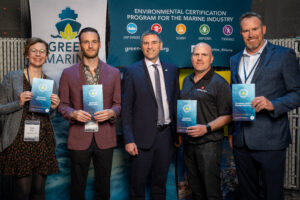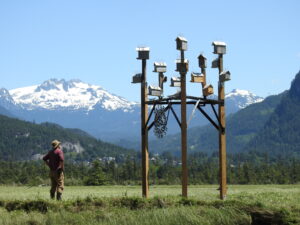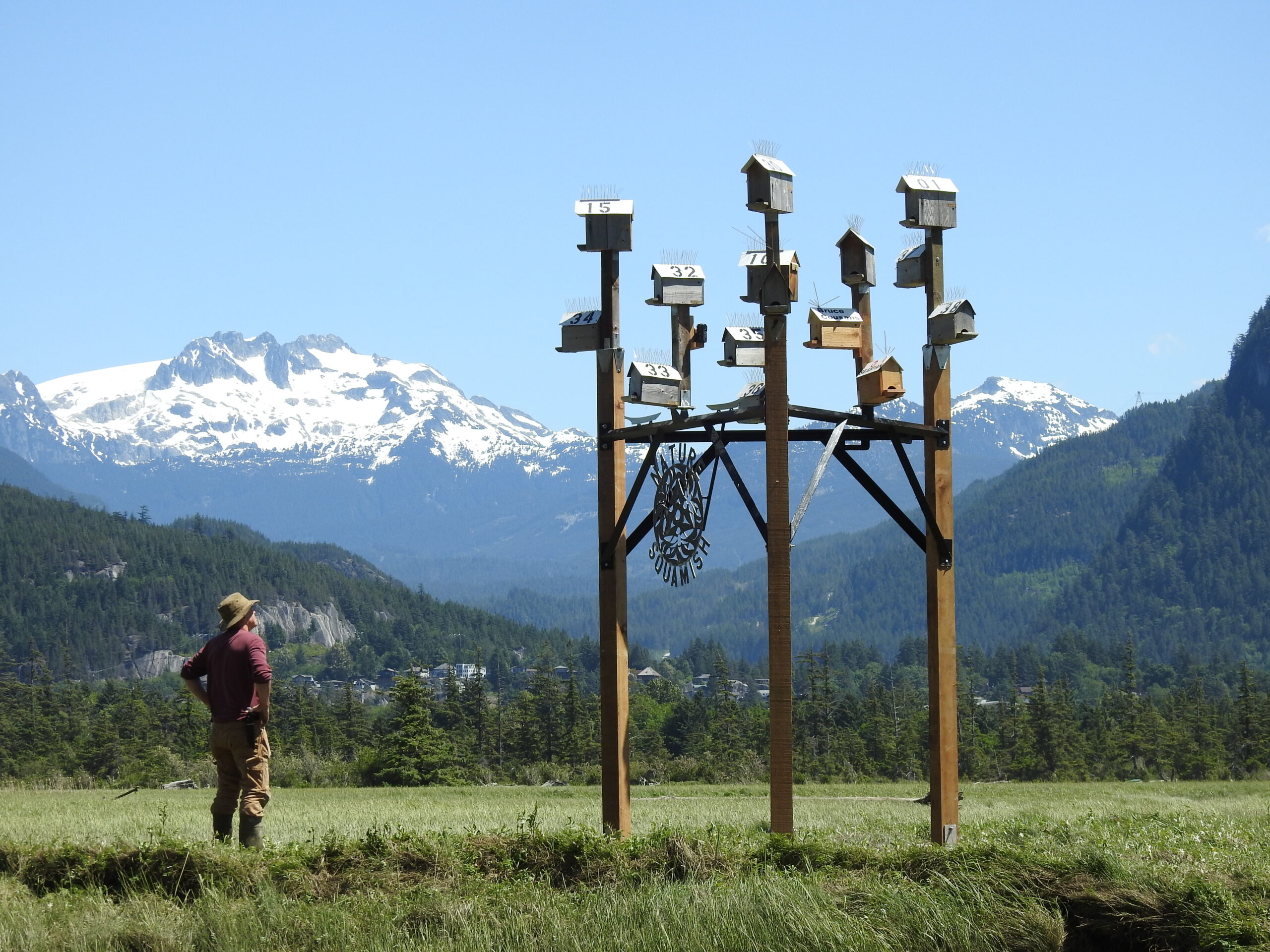April 22, 2024
At Seaspan, environmental stewardship is part of who we are as an organization. We are dedicated to operating sustainably, and continually enhancing our environmental performance.
As we mark Earth Week, we are reflecting on some of our environmental initiatives that support the people, communities, and natural environment where we work. This year’s Earth Week theme, “Reimagining Our Future,” underscores the urgency to adopt sustainable practices and work together to protect and preserve the planet for future generations.
Keeping BC’s coast quiet with HaiSea Marine
HaiSea was created in true partnership with the Haisla Nation with feedback from Seaspan’s mariners. As a modern marine start-up, HaiSea had the remarkable opportunity to build its culture and assets with a focus on Indigenous reconciliation and long-term employment opportunities for the Haisla Nation and neighbouring Gitxaala, and Gitga’at Nations; protecting the environment with the greenest tugboat fleet in the world; and a culture that is diverse and inclusive.
The HaiSea fleet consists of three fully electric tugboats and two dual-fuel (LNG and diesel) escort tugs that will be based in Kitimat and will provide ship-assist and escort towing services to LNG carriers calling at LNG Canada’s new export facility in the traditional territory of the Haisla Nation.
The team set out to make good on their promises to the Haisla Nation and build one of the greenest fleets in the world to ply their home waters. This vision was recently validated by the HaiSea Wamis receiving an Underwater Noise Notation from the American Bureau of Shipping. To gain this notation, the HaiSea Wamis performed sea trials up and down Indian Arm last fall to put its ultra-low underwater noise to the test — and it passed. Data was measured over a two-day period from underwater hydrophones to prove the Wamis could perform under established benchmarks for noise. The results confirmed that HaiSea’s electric tugboats will be among the quietest vessels on BC’s coast. In fact, you would need to line up 10 electric tugboats side-by-side to equal the underwater noise produced by one conventional diesel tug. The innovation and focus on the environment represent the future of the marine industry and HaiSea is leading the way.
Seaspan celebrates the delivery of three EV shuttle buses
If you commute during peak hours on the North Shore, chances are you have caught a glimpse of Seaspan’s three electric employee shuttle buses in action. The shuttles feature custom, Indigenous artwork designed by Olivia George of the Tsleil-Waututh Nation (səl̓ilw̓ətaʔɬ), and Ray Natraoro of the Squamish Nation (Sḵwx̱wú7mesh Úxwumixw).
Seaspan’s electric shuttle buses help transport our workforce to and from Pemberton Campus in North Vancouver and represent Seaspan’s commitment to inclusivity and collaboration with its Indigenous neighbours. The shuttles have a range of approximately 160 km on a single charge and utilize ChargePoint’s first level 3 charger installed in Canada and can be fully re-charged in 30 minutes, greatly reducing Seaspan’s carbon footprint.
Seaspan recently added a third EV bus to its fleet and together, the buses will save an estimated 700 tonnes of CO₂ equivalent over a 10-year time span.
Going above and beyond environmental regulations with Green Marine
Since 2010, Seaspan has been an active member in the Green Marine Environmental Certification Program. Green Marine is a voluntary initiative that helps its participants improve their environmental performance beyond regulations. Green Marine targets key environmental issues related to air, water, and soil quality, biodiversity protection, and community relations. Fun fact: Seaspan was the first ever major West Coast Ship Owner and first ever shipyard participant to join Green Marine in North America.
Conserving energy through lighting upgrades across our three shipyards
Seaspan was proud to partner with BC Hydro under their Industrial Energy Manager Program. Initiatives implemented in 2023 under this program resulted in well over 500,000 kWh of energy savings across all three shipyards. This energy savings initiative saw Seaspan replace hundreds of lights within our shipyards with LED fixtures and controls.

Protecting wildlife habitat and biodiversity
Seaspan supported the Pacific Salmon Foundation’s Community Salmon Program with a donation of $25,000 to help the North Shore Streamkeepers advance restoration work in salmon-bearing Lynn Creek. Since 2013, Seaspan has donated $118,500 to the Pacific Salmon Foundation in support of their efforts to advance community-based salmon habitat restoration.
In addition to supporting juvenile salmon, Seaspan also played a part in helping to build habitats for Western Purple Martins – an at-risk species of bird that calls the Squamish Estuary home. John Buchanan, a shipfitter at Vancouver Shipyards, designed and built custom nest boxes with the Squamish Environment Society after they became aware that the colony’s existing nest boxes were going to be destroyed as part of a land tenure closure. With Seaspan’s support, John was able to source scrap materials from the shipyard and Seaspan donated to cover the cost of remaining materials needed. In June of 2023, 15 volunteers helped John install the new nest boxes in time for the bird colony to migrate to their new habitat.
John and a group of volunteers recently installed a second nesting structure at the site in April of this year, providing an additional 15 nesting boxes for the Western Purple Martins.
Marine decarbonization and climate change
Seaspan Marine is an industry leader in its drive to reduce Greenhouse Gas Emissions and decarbonize its fleets. In 2023, Seaspan Marine reduced emissions through trialing renewable diesel in ship docking tugboats, and we also piloted biofuels in older coastal towing vessels such as the Seaspan Commodore. And Seaspan Ferries implemented numerous industry leading initiatives including increasing battery capacity and usage across its battery/LNG powered vessel fleet, utilizing biodiesel in place of diesel where possible, and increasing use of electric shunt trucks at its terminals.
